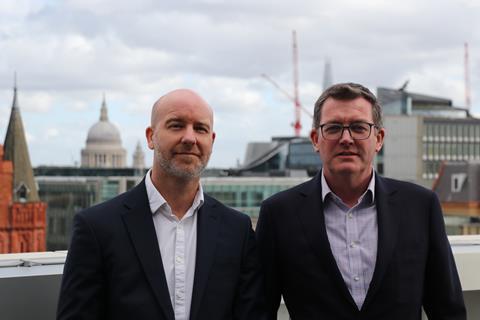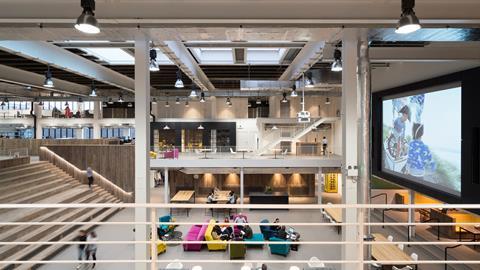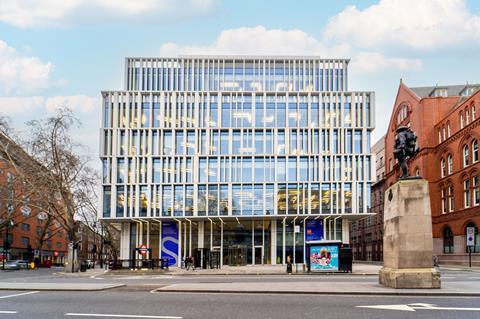With a new name and a new home, the consultant formerly known as Elementa says it is ready for the big-time. Daniel Gayne went to find out how they plan to get there
If you haven’t heard of Introba, you may know them by another name. Since setting up as CGH Building Services Engineers in 1987, the engineering consultancy has built a reputation for punching above its weight.
Under its most recent moniker – Elementa Consulting – it has been a regular feature on industry awards shortlists for work including the UK’s first Passivhaus Plus school and the world’s first whole-life net-zero hotel. Given this enviable reputation, you would be forgiven for asking: Why change the name?
When Elementa became Introba last summer, it was finally united in branding with its American parent company (née Integral Group) and the network of green engineering firms that had operated under its umbrella. So does the rebranding signal a loss of independence for the consultant? Or is this simply the beginning of another chapter in the firm’s steady ascent?

Brian Goldsmith, managing director of Introba in UK and Europe, and Doug Kerr, its director of regional strategy and development, are still settling in when Building meets them at their shiny office in Holborn. “The name change makes things simpler for us,” Kerr says. “Elementa Consulting had a great name, people knew it in the UK, but we were always part of Integral and had challenges operating under a different name.”
As a global entity, Introba has more than 1,100 employees in 31 offices across the US, UK, Serbia and Australia. But, for all Kerr and Goldsmith’s talk of “transferring best practice” and “knowledge share” across the organisation, both men are keen to emphasise that the UK and European arm – which employs nearly 170 people in London, Oxford and Belgrade – will remain “an independent business in a sense”, with its own strategy for growth.
Kerr joined the firm more than two decades ago when it was a small, niche consultancy focused solely on MEP and saw how its takeover by Integral in 2012 changed the focus and ambition of the consultant. “That was a huge move forward, because what it allowed us to do is really start to drive forward the sustainability and deep green engineering agenda,” he says, slipping in a piece of company jargon as if it were a concept everybody is familiar with.
For those that do not subscribe to Introba/Elementa press releases, deep green engineering is about “maximising performance with minimal impact”. In other words, it is about designing systems so that they are genuinely sustainable, not simply to pass sustainability criteria.
“We are more driven by the journey with our clients and explaining that it is not all about the certification, but the philosophy and the thinking behind those certifications,” says the softly-spoken Goldsmith. “Achieving net zero should become the norm, we should not have to say that it is a special project.”
“The future will be about not just looking at individual buildings, but the wider collective piece”
Brian Goldsmith, managing director, Introba UK
If you are looking for special projects, though, Introba is not short of them. The business provided MEP services for Hackbridge Primary School in Sutton, the UK’s first Passivhaus Plus and net zero school, and worked as MEP and carbon consultants on Room2 in Chiswick, the world’s first whole-life net zero hotel. Both projects helped Introba pick up award nominations, as did its work on Boden’s HQ in west London, which Goldsmith selects as one of his favourites.
When the project team came to the site, what they had was a 1960s building attached to a warehouse, disused except as a filming location for the BBC’s forensic pathology procedural Silent Witness. Not only did they manage to take the building from an EPC G to B, through upgrading the windows and facade of the front building and other upgrades to the warehouse at the rear, but they also created a modern workspace that was recognised as winner of the BCO’s refurbished and recycled award in 2019.
Among the business’ more interesting ongoing projects is its work at Canary Wharf on what will be the largest Passivhaus student accommodation in Europe – “if it’s built correctly”, Goldsmith notes wryly.

Even though building projects make good headlines, much of the consultant’s work is elsewhere. It is working with local authorities in Oxfordshire to develop net zero road maps and in 2017 led the creation of the London Energy Transformation Initiative (LETI) in an effort to support the transition of the capital’s built environment to meet net zero goals.
LETI’s Climate Emergency Design Guide, lead edited by Introba associate Clara Bagenal George, had an influence on the latest London Plan and the group, now known as the Low Energy Transformation Initiative (another name change), today has more than 1,000 members.
Goldsmith says the increasing centrality of sustainability to building service design has contributed to the widening scope of the firm’s work and necessitated earlier engagement of MEP engineers in building projects. He is quite bold about what the future of building services design will entail.
“The future will be about not just looking at individual buildings, but the wider collective piece,” he says, giving the example of the benefit that could be reaped from linking a hospital to a nearby leisure centre so that waste heat from the former can be used to heat a swimming pool in the latter.
“There is going to be much wider thinking in towns and cities. You need to treat buildings as part of an overall ecosystem.”
>> Click here for more In Business interviews
Introba sees itself as having a major role in pushing forward the green agenda in the built environment but, in order to keep doing that, Kerr says, size matters.
The firm’s five-year plan involves scaling up to around 300 staff across Europe and, while they will not pin an exact date on achieving that ambition, Kerr says the expansion will probably include a mixture of organic growth and acquisitions. “We want to drive our business to have more impact,” he says. “We want to grow, but we are not fixated by a figure.”
Goldsmith adds: “If it comes sooner, it would be great, but it doesn’t have to.”
The pair say Introba is already making progress towards their growth goals. Its most recent accounts for the UK and Europe, which cover the period up to the end of 2021, show turnover of £8.1m – roughly equal to the revenue recorded the year before its covid-hit 2020 numbers.
Goldsmith says they broke through the £10m barrier in 2022 and are now expecting to hit that number in the UK alone in this financial year. Goldsmith says the firm’s profit margin ranges between 6% and 10% in different years and that this is reinvested into R&D, training and development.
“We have grown steadily, consistently, and now we have got a great reputation, but now we need to scale up,” Kerr says. “We don’t want to be big for big’s sake, but to make more impact we have to be of a certain scale.”
Growing room: Introba’s new Holborn home

One thing is for sure, Introba is not short of space to grow into. The firm’s ultimate owner is the Dar Group, which also owns consultant Currie & Brown and architect Perkins + Will.
The group’s component companies had always operated in separate buildings in the UK, until a few months ago when more than 1,000 staff were united in moving into 150 Holborn, built by McLaren. Both Perkins and Introba were on the project team for the new headquarters, which according to the Dar Group was meant to signal the beginning of a major push into UK property and infrastructure and a “demonstration of commitment” to the country.
The building replaced a 1980s office block with a mixed-use scheme incorporating public retail, a café and exhibition space on the ground floor, as well as a private landscaped roof terrace.



























No comments yet